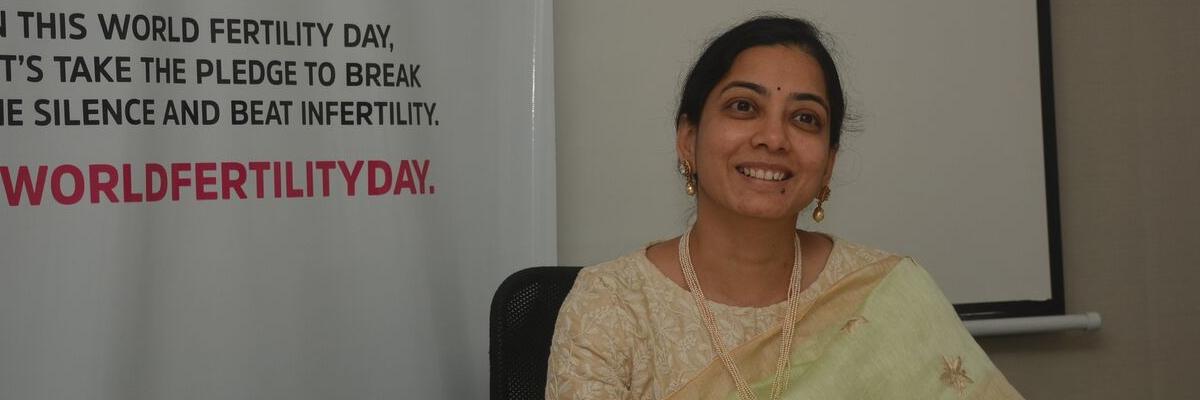Live
- PM ‘cursing’ Congress out of despair: Maharashtra Cong Chief
- Applications are invited for Junior Colleges Scheme District Scheduled Castes Development Officer Ramlal
- A nomination was filed on the second day for the Nagar Kurnool parliamentary seat
- SP Gaikwad inspected the Telangana Amarnath Saleswaram Jatara yatra arrangements
- Rahul Gandhi's decision to contest from Wayanad shows 'lack of confidence': BJP President Nadda
- IPL 2024: Delhi bowlers will go after all of SRH’s top-order batters, says head coach Ricky Ponting
- At Amroha rally, PM Modi sends out ‘meaningful’ message for Muslims and Hindus
- Tripura records highest 79.83 pc voter turnout in Northeast
- The government has to clear the confusion
- UP: Police officers, govt doctors to appear virtually in courts
Just In

About 1020 of infertility cases in Hyderabad are due to low ovarian reserve observed in women The ovarian reserve decides the fertility period or fertility health in females As women delay pregnancies, their ovarian reserve tends to deplete gradually, as the age increases, leading to difficulty in conceiving naturally or in some cases causing infertility
About 10-20% of infertility cases in Hyderabad are due to low ovarian reserve observed in women. The ovarian reserve decides the fertility period or fertility health in females. As women delay pregnancies, their ovarian reserve tends to deplete gradually, as the age increases, leading to difficulty in conceiving naturally or in some cases causing infertility.
With more and more women choosing to pursue higher education and career growth over marriage and starting a family, a rise is seen in the number of low ovarian reserve cases being reported. Dr Lakshmi Chirumamilla, Fertility Consultant, Nova IVI Fertility, Hyderabad shares about how a woman is born with a fixed number of ovarian follicles, which subsequently reduce as she ages due to degeneration and ovulation till menopause.
Age does matter
Ovarian reserve refers to the quantity and quality of the follicles left in a woman’s ovaries that could mature into viable oocytes (eggs) which indicates the reproductive potential of a woman. A woman’s menstrual cycle follows a regular pattern. Every month usually one egg is released by ovulation after menarche.Age is an important predictor of ovarian reserve - with a normal reserve in younger age groups and a gradually decreasing reserve as age advances. However, women of the same age can have different ovarian reserve.
Research has proved that fertility peaks before the age of thirty and thereafter gradually starts declining. A study by Nova IVI Fertility revealed that the ovaries of Indian women age 6 years faster than that of Caucasian women. Therefore, aping the West and delaying pregnancy too long is not advised for Indian women. Also, there are several factors which reduce the ovarian reserve of a woman, namely - age related decline, chemotherapy or radiotherapy of ovaries, prior ovarian surgeries, endometrioma, pelvic infections (TB), genetic cause, autoimmune, and idiopathic.
Not the least is because of changing life styles, environmental pollution, smoking, using plastic utensils, cosmetics etc can also cause early menopause and decline in infertility. There are some hypothesis saying that women s reserve would be decided by the intra uterine environment. And the life style of the mother
What is AMH Test?
During a reproductive cycle a woman loses around 30-50 eggs every month which results in a drop in her ovarian reserve, eventually leading to total depletion at the age of 45-50 years, when menopause occurs. In cases where women plan to delay pregnancy, a simple blood test called AMH test can help them understand how much longer they can postpone child-bearing and accordingly plan their pregnancy.
How to know your ovarian reserve
The fertility health of a woman largely depends on her age. As a woman’s ovarian reserve plays a major role in planning pregnancy, one should always keep a check on the same. Anti- Mullerian Hormone (AMH) test is the most recommended diagnosis to determine the fertility potential of a woman. AMH is secreted by cells in the developing sacs (follicles) and is a marker for ovarian reserve that is assessed through a blood test. Another common test is an Antral Follicle Count (AFC) which helps to determine the ovarian reserve via a transvaginal ultrasound. The level of AMH in a woman’s blood combined with an AFC is the most reliable and effective marker of an ovarian reserve and helps in knowing the number of eggs and the number of fertile years a womanmay have in future.
There are other tests to predict the fertility potential in a female like follicular stimulating hormone (FSH) test and basal estradiol. But many studies have demonstrated that AMH is currently the best available measure of the ovarian reserve under a variety of clinical situations such as IVF (in-vitro fertilisation), forecasting reproductive lifespan, and ovarian dysfunction. Sometimes, in certain conditions like PCOS and endometriosis, the AMH may be normal but the quality of the eggs can be poor. Unfortunately, once the ovarian reserve is depleted, medication cannot help reversing it. In case a woman suffers from infertility, treatments like IUI (intrauterine insemination) and IVF (in-vitro fertilisation) can help increase the probability of pregnancy.
The option to freeze eggs
Women who could not find the Mr. Right or want to postpone conception have the option of freezing their eggs. By doing so, even though their age increases, the chances of achieving pregnancy will remain the same as the age of the woman at which she has frozen the eggs. There is no minimum age of freezing, but the earlier the better. This same technology can also be applied to women who are diagnosed of cancer and need chemotherapy or radiotherapy. Sometimes women suffering with auto immune diseases also need chemotherapy treatment when egg freezing is advised.

© 2024 Hyderabad Media House Limited/The Hans India. All rights reserved. Powered by hocalwire.com







